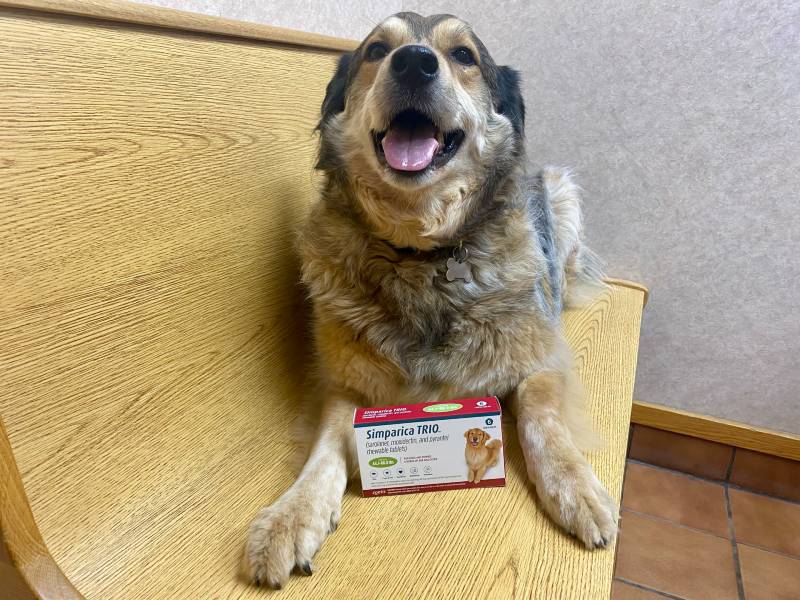
Why is year-round prevention essential for parasite control?
As a veterinary hospital in the midwest, we get a lot of questions about preventative medications. For example, “Why do I need to give my pet heartworm protection in the winter when there are no mosquitos around?” Well, while it’s true that we are for the most part free of mosquitos this time of year, it’s still important to keep giving your pet their parasite prevention medication all year long, no matter what the weather is like.
Many types of pests
Part of the reason for year-round vigilance is that there are many types of parasites to protect against, some of which don’t take a winter break. “The things preventative medicines protect against today are intestinal parasites, diseases transmitted by ticks, flea control, and heartworm disease,” said Dr. Richard Siegle.
“As far as intestinal parasites, the Centers for Disease Control recommend deworming family pets once a month.” Roundworms and hookworms, carriers of diseases potentially transmitted to people, showed up 2% of dogs in recent fecal checks in Kent County. “2% doesn’t seem like a lot,” said Dr. Siegle, “but that represents a good 1,000 dogs in this county just among the dogs who were tested. There’s a human health concern involved that people should be aware of.”
Extra protection against heartworm disease Dr. Siegle and a patient who receives heartworm, flea, and tick prevention year round.
Dr. Siegle and a patient who receives heartworm, flea, and tick prevention year round.
Even though we aren't getting bites from mosquitoes this time of year, the threat from the mosquito-borne heartworm disease is still present, and heartworm preventatives can be effective for far longer than you might think. “Recent studies have shown that a little more than1% of the dogs are positive for heartworm disease in Kent County,” said Dr. Siegle. Those heartworm-positive dogs throughout the county could potentially spread heartworm to other dogs with the help of mosquitoes.
“Most heartworm medicines work one to two months after the mosquito bites the dog,” said Dr. Siegle. “So your heartworm preventive doesn't necessarily work the month that you give it. It works backwards; for example, if a mosquito bites a dog December 1, this medicine may not be effective in controlling heartworm disease until late January. And with our irregular winter weather pattern, where it gets into the 50s in February quite regularly, you never know if there's going to be a hatching of mosquitoes. Periodically, you may see a mosquito in your house this time of year. It’s always best to be prepared.”
Trouble with ticks
Tick-borne illnesses are a problem year-round as well. “Ticks can be active anytime it's 40 degrees or more,” said Dr. Siegle. “And last year in Kent County, over 2,000 dogs were positive for being exposed to tick-borne diseases.” The increase in tick-borne diseases in Michigan has risen dramatically over the last five to seven years.
“The predictions by the Companion Animal Parasite Council is that tick-borne problems in the Midwest will just continue to increase,” said Dr. Siegle. “Lyme Disease gets the most public awareness, but there’s also Anaplasmosis and Ehrlichia, tick-borne diseases that dogs and people are susceptible to.”
An itchy situation
Even when it’s cold outside, fleas can find their way into your house and onto your dog. “Fleas are more of a year-round problem because flea eggs can lay dormant for up to a year before they are hatched,” said Dr. Siegle. “And it's not uncommon that people will come in in the wintertime with an itchy dog, and it’s a result of the pet having fleas after they’ve stopped their flea control. What happened was, microscopic eggs were laid and fell off the dog in the house, and then in the wintertime, the flea eggs hatched.”
Keeping cats comfortable
While the triple threat of fleas, ticks, and intestinal parasites can and do affect cats, ticks tend to be less of a problem. “Cats do a better job in grooming themselves,” said Dr. Siegle. “A lot of times with ticks, they brush them off prior to them really attaching firmly and passing on the disease.”
Still, a good preventative for cats, such as Revolution Plus, is essential to protect against parasites that grooming can’t control, such as fleas, intestinal parasites, and ear mites. “It also controls heartworm disease, which isn’t as common in cats as it is in dogs, but they can get it,” said Dr. Siegle.
 A dog poses with a box of all-in-one heartworm, flea, and tick treatment Simparica TrioAll-in-ones
A dog poses with a box of all-in-one heartworm, flea, and tick treatment Simparica TrioAll-in-ones
While Revolution Plus does the job for cats, Simparica Trio for dogs “is a once-a-month medication that controls heartworm, intestinal parasites, fleas, and ticks. And there’s also numerous combinations of medications that control all of them,” said Dr. Siegle. “It depends upon the veterinarian, what they like, and also depending upon the dog's lifestyle. Is it an inside dog? Is it very active outside? Does it go swimming?” These are all questions your veterinarian will ask to determine the best preventatives for your dog.
The right source
Where should you get your preventatives? Dr. Siegle outlined why it’s better for you and your pet for you to obtain your preventatives from your veterinarian rather than an online prescription service. “First of all, the manufacturers of these parasite control medications give a guarantee that if people use medicines year round and buy them through a veterinarian, they will pay the cost of treatment of these diseases if the pet comes down with it.”
“Secondly, with manufacturer rebates, as a whole, our pricing is very competitive to pricing online. Finally, if you get your preventatives through the veterinarian, we’ll have complete records of when you got it and we’ll be able to send out reminders for more parasite control.”
If you are looking for a veterinarian in the Grand Rapids, Michigan area, contact us today.



